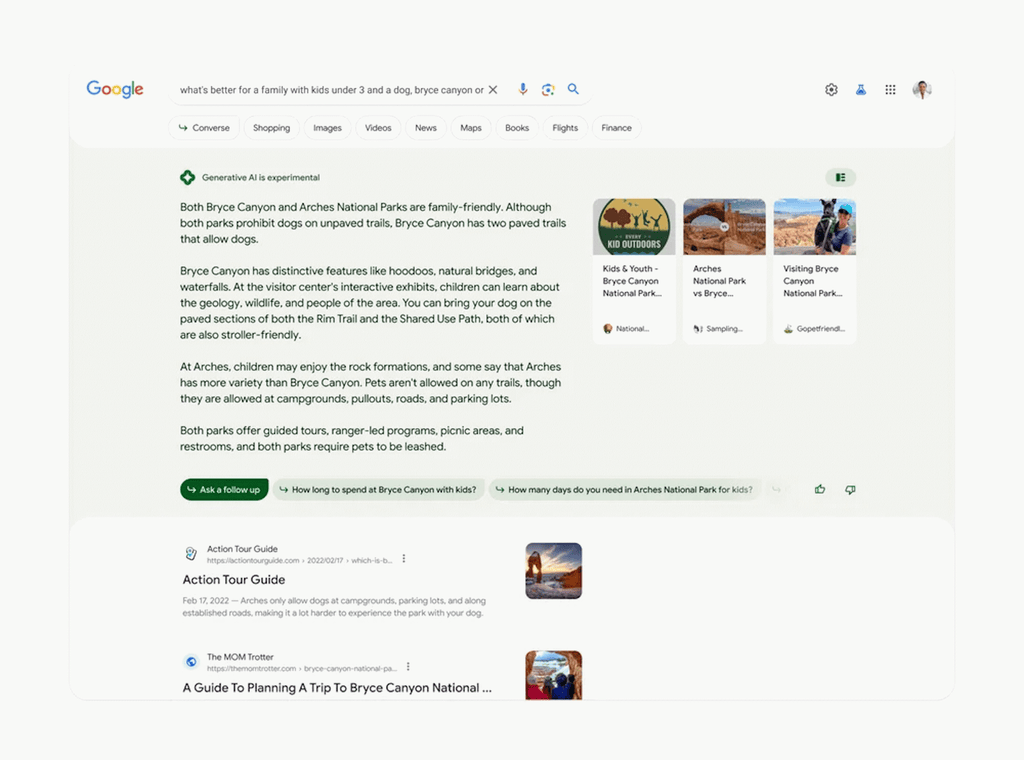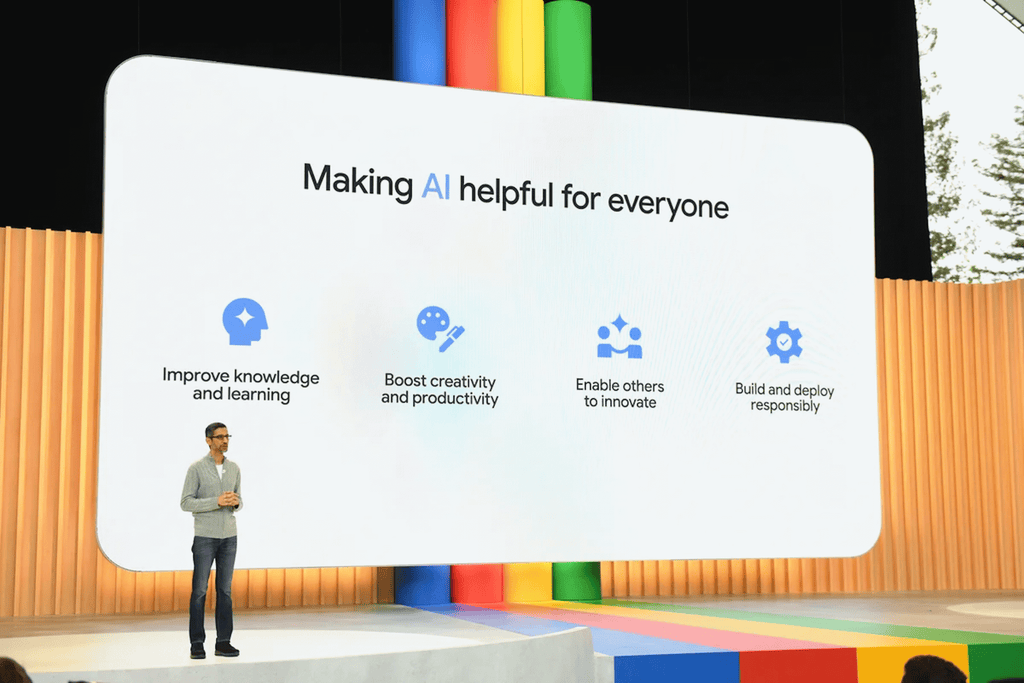Google SGE launches in the UK: what does it mean for SEO?
- Olly Green
- Read time: 11 minutes

As Google’s Search Generative Experience (SGE) launches in the UK for the first time, we’ve pulled together everything you need to know about the test of the AI-powered snapshots. With the introduction of SGE likely to have a profound impact on the world of search, our Senior SEO Leads Bradley Webster and Martin Wood, and Senior Content Strategist Adam Brannon, have also provided insight into what could change for marketers and how to prepare.
When did the Google SGE test begin?
Could Google Search AI features become paid?
What is Google SGE?
The evolution of generative AI is changing the world of search, and the rollout of Google’s SGE in the UK is another significant milestone.
Google SGE is an experimental update which provides an AI-powered snapshot of key information at the top of search engine results pages (SERPs), aiming to help users understand topics faster and uncover new insights more easily.
The snapshot includes relevant links and the ability to ask follow-up questions, with context carried over from question-to-question for a conversational experience.
Google SGE also aims to enhance vertical experiences, which are related to a specific industry, topic, or field. For example, product queries will see generative AI uncover key considerations as well as product information, options, prices, reviews, and images.
Effectively, Google SGE leverages AI technology such as deep learning, machine learning, and natural language processing to understand a search query, present the most relevant content on the SERP, and suggest potential follow-ups.
BW: “While the impact of SGE will not be clear until the full rollout in the UK, we can presume that organic traffic will decrease overall as a result. A recent Search Engine Land study of 23 websites saw that the average drop in organic traffic was between 18% and 64%.
“This all largely depends on the industry your website operates in, whether you are targeting mainly informational or commercial keywords, and in turn, how your customers navigate the search results.
“However, it is unlikely to affect commercial queries the same as informational queries.”
MW: “The uncertainty within the SEO community is a mix of fear and excitement. The overall effect on search is a mystery until SGE is fully rolled out. However, from what we can see, informational content is likely to be affected the most, with AI being able to answer these types of queries more effectively.
“The best armour to equip yourself with against SGE is to be unique, with real life expertise and experience (E-E-A-T). AI will never match real life experience and opinions from an expert with personalised content for a user.”
AB: “Google has been banging the helpful content drum for quite some time now, renaming E-A-T as E-E-A-T to introduce an experience portion to the expertise, authoritativeness and trustworthiness puzzle. More recently, we’ve seen mass AI-generated content targeted with algorithm updates, and it’s likely that this will continue.
“Ensuring your content demonstrates all of these values will be key to not being left behind by SGE. Don’t panic, just focus your efforts on your niche, and make sure you are creating useful content that provides the reader with genuine value.”

When did the Google SGE test begin?
Google rolled out SGE on its main Google Search interface in March 2024 – when it also launched its Core Update - testing the AI-powered overviews on “a subset of queries, on a small percentage of search traffic in the US”.
That subset was comprised of queries which Google was confident its generative AI experience could provide valuable insights for – and provide an overall better response than what would normally be seen on its SERP.
By November last year, SGE had become available in Search Labs in more than 120 new countries and territories, including Mexico, Brazil, South Korea, and South Africa. Four new languages - Spanish, Portuguese, Korean and Indonesian – were also added.
Last week, SGE became available in the UK for the first time as its AI overviews began appearing for a “small slice” of logged-in users – rather than for those who had opted in on Search Labs – in an expansion of the trial launched in the US in March.
BW: “We know from experience of Google testing changes, that they are looking for feedback on how these new elements are used. Looking at areas such as:
- User satisfaction: how these latest changes affect click-through rate, and general pogo hopping between results.
- User engagement: are users interacting with SGE? And if so, in what capacity?
- Trends and patterns: any emerging shifts in user interests, such as new search behaviour that can inform future updates.
“Ultimately, Google wants to answer users’ queries as quickly and efficiently as possible.”
MW: “As Bradley mentioned, Google wants to streamline the process for a user as much as possible, with accurate and reliable results. Do users like the new interface? Do users understand the changes within search (AI)? Do users find the AI answer useful enough to not click on multiple other links?
“Ultimately, all this information will be used to tinker the interface and how SGE operates in general.”
How to prepare for Google SGE
The introduction of Google SGE is an extremely hot topic given the potential impact it could have on organic traffic, the behaviour of users, and the overall future of search.
The AI-generated snippet will of course dominate the top of the SERP, pushing any other results down the page. This shift could have a devastating effect on sites’ traffic.
However, there is the argument that the information in the AI-generated response is extracted from relevant content and SGE will cite these sources – providing users with the option to click through and continue reaching high-ranking sites.
The question remains how inclined users will be to click through – if the AI-generated information answers their query, they will have little reason to probe further.
Today, marketers have no choice but to adapt to new generative AI tools and advancements. Should we see a full rollout of Google SGE, how may SEOs need to adapt their approach?
BW: “We know that SGE is going to take up more real estate in the SERPs, pushing down otherwise position one rankings. Therefore, it is more important than ever to review areas such as conversion rate to ensure that your website is better equipped to cater for those who slip between the cracks.
“Additionally, we know from early results that SGE is urging users towards more specific queries. Therefore, it may be worth looking into content that suits more long-tail searches. For example, instead of ‘best glasses’, you could write more detailed content about ‘best glasses to wear at night while driving’.
“Causing a shift in content strategies to not just focus on driving traffic, but meaningful traffic that converts. And ensuring that your informational content works in tandem with commercial content to create a cohesive brand journey.”

MW: “As previously mentioned, informational content is likely to be hit the hardest. Why should a user click through to your content over a competitor or a generated AI response? We need to think of digging deeper into unique perspectives. What lies beneath the generic answer, what can you offer a user that they cannot find elsewhere?
“If a user is enquiring about a product, do you have all related questions covered regarding the product? Do you have video tutorials, research in testing the product compared to other offerings?
“SEOs need to ensure businesses think about these details more closely. Gone are the days of optimising for one keyword. We need to think about topic entities and related talking points more than ever to show a businesses’ authority in the topic.”
AB: “The hub and spoke approach to content creation is going to be more relevant than ever. As Bradley has highlighted, making sure your informational content works well alongside your commercial content will be important in showing the E-E-A-T value of your brand.
“By hub and spoke, particularly for eCommerce brands, I refer to a cluster of informational content or guides that help support your core commercial pages. For example, if we use the glasses example previously, your commercial page could be supported by articles looking at ‘best glasses for your face shape’, ‘best glasses to wear while driving’ as well as brand guides.”
When will Google SGE launch?
Google “have not yet made a final decision on whether or when to launch” SGE, according to the Financial Times, though there has been some speculation that it could be announced at Google I/O on May 14.
Elizabeth Reid, Google’s VP of Search, suggested in an interview with Wired that if/when SGE rolls out fully, there won’t be a ‘light-switch moment’ when it completely replaces the typical Google Search system.

Could Google Search AI features become paid?
As the Google SGE test expands, it has been reported by the Financial Times that Google is considering making its AI-powered search features exclusive to premium subscribers.
Though the report didn’t specifically mention SGE, the prospect of AI-generated overviews appearing only for users paying £18.99 a month for Google One AI Premium tier is an intriguing one. It was also underlined that SGE would continue to show ads for premium subscribers, and that Google is “not working on or considering” an ad-free search experience.
BW: “Unless there is a definitive benefit of utilising AI over traditional means which we are accustomed to, we are unlikely to see the majority flock to a paid alternative.
“If Google SGE became a paid feature, we can expect that it would have less of an overall impact on the search results, and your bottom line as a result.”
MW: “I don’t think paying for an AI experience in its current state will provide enough benefit for the user – however, never say never with this fast-changing landscape.
“A paid search experience is unlikely to impact organic traffic significantly. Ultimately, if a business/website can provide a suitable product or answer to a user’s query, then Google’s responsibility should be to show that result above anything else.”
If you want to discover how our SEO and Content Marketing experts can help you prepare for key search engine changes like Google SGE, get in touch with our team today.